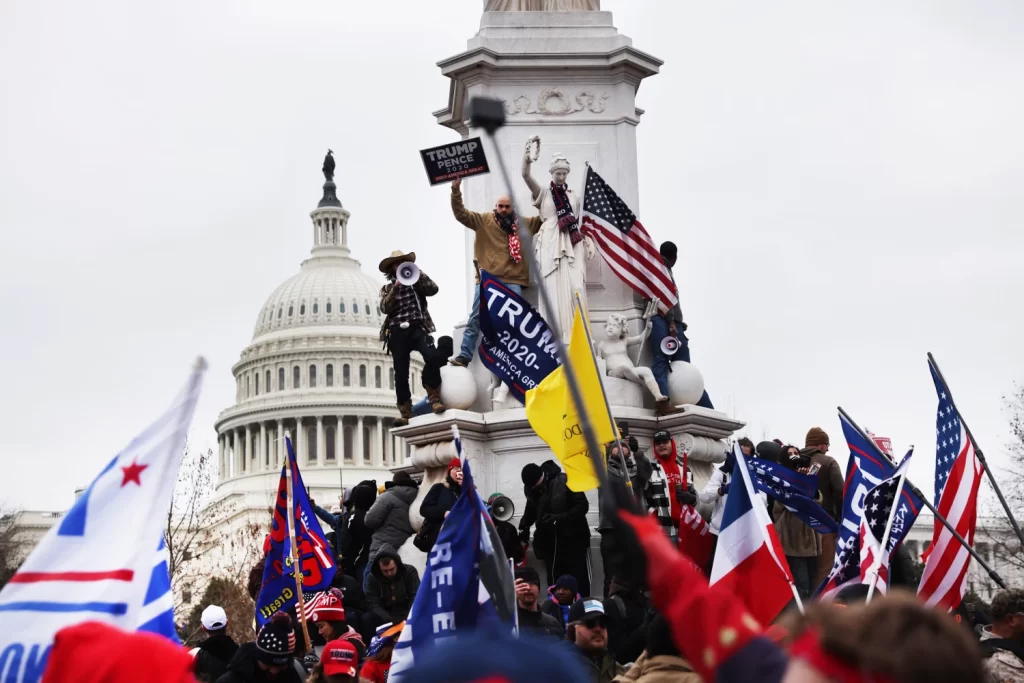
As Donald Trump prepares for his return to the White House, he faces a significant and controversial decision: whether to honor his campaign pledge to pardon those involved in the January 6 Capitol riot. This issue has become a focal point of both his base’s expectations and broader political concerns. With the president-elect’s rise marking the beginning of another chapter in American politics, the question of pardons for January 6 rioters is both a symbolic and practical dilemma.
On a warm November evening in Washington, D.C., a vigil was held outside the city’s largest jail, as it had been for nearly 800 nights since the Capitol attack. This gathering, however, had a celebratory tone as champagne was popped, and the crowd toasted to Trump’s electoral victory. Leading the group was Micki Witthoeft, the mother of Ashli Babbitt, a Trump supporter shot and killed while attempting to breach a restricted area of the Capitol on January 6. Witthoeft, and others who have championed the cause of pardoning the January 6 rioters, now eagerly anticipate that Trump will follow through on his promise to release what they call the “political prisoners” of the insurrection.
The movement has been a constant since 2021, with activists rallying for the release of rioters who stormed the Capitol in an attempt to overturn the results of the 2020 election. While a majority of Americans view those involved in the Capitol riot as criminals who attacked democracy, Trump’s supporters view the rioters as victims of a politically motivated prosecution, and they are hoping for a sweeping pardon from the incoming president.
Yet the question of whether Trump will grant clemency to the rioters remains uncertain. Some of his most ardent followers are calling for him to pardon all those involved in the insurrection, including those who violently assaulted police officers. However, doing so could alienate a broader electorate and even his own Republican allies, many of whom have cautioned against pardoning anyone who participated in violent actions on January 6.
Trump’s team has been mum about the specifics of what he intends to do, though his transition spokesperson, Karoline Leavitt, told CNN that Trump would consider pardon requests on a “case-by-case” basis. This leaves open the question of whether Trump will issue a blanket pardon, which would shield all defendants from further legal consequences, or if he will be more selective in who he chooses to forgive.
The decision is complicated by the fact that many of those involved in the Capitol attack face serious charges, with nearly 1,500 individuals arrested in connection with the riot. While a significant portion of those arrested face relatively minor charges such as trespassing, others have been convicted of felonies, including assaulting officers or attempting to subvert the government. Some individuals are still awaiting trial, and Trump’s decision could affect their fates.
In the campaign leading up to the 2024 election, Trump repeatedly expressed support for pardoning the rioters, but he did so with some caveats. He stated he would look “very favorably” at pardons, especially for those who expressed regret, but he also acknowledged that some rioters “got out of control.” He has not clarified how he will approach this issue, particularly when considering the wide range of offenses committed during the insurrection.
For the rioters themselves, the hope is that Trump will fulfill his promises. Some defendants, such as Zachary Alam—convicted of multiple felonies including assaulting police—have made public pleas for clemency, while others are more reserved, yet still hopeful that their time will come. Families of the rioters are also eager for a pardon, believing that Trump’s victory signals the return of their loved ones. Savannah Huntington, the daughter of convicted rioter Rachel Powell, voiced her belief that Trump will make good on his word, citing his historical reputation for following through on campaign promises.
Defense attorneys for the rioters are actively preparing petitions for clemency, both through the formal channels of the Justice Department and through more informal routes, remembering how Trump has been known to bypass the traditional pardon process in the past. Legal teams are hopeful that clemency will come in the form of pardons or sentence reductions, allowing defendants to rebuild their lives and restore their reputations.
However, granting blanket pardons could have profound political consequences. The idea of pardoning individuals who attacked police officers or sought to disrupt the certification of a legitimate election could be seen as undermining the rule of law, a sentiment shared by critics across the political spectrum. Many lawmakers, including some within Trump’s own party, have already signaled their opposition to pardoning anyone who engaged in violent actions on January 6, with GOP Senators Tom Cotton and Markwayne Mullin among those who have drawn a hard line.
Polling data also suggests that a majority of Americans oppose pardoning most of the January 6 rioters, with 69% of Americans, including 77% of moderates and 71% of independents, expressing opposition. Even among Republicans, support for such pardons is far from unanimous, with a recent survey showing 55% in favor and 45% against.
For those advocating for the rioters, the stakes are high. Groups like the J6 Pardon Project and American Patriot Relief have mobilized to ensure their voices are heard, putting pressure on Trump to act swiftly. Whether Trump delivers on his promises will likely shape his presidency and define his relationship with his base.
In the end, the decision rests solely with Trump. He can choose to issue pardons on an individual basis, offer a broad clemency proclamation, or leave the matter to the courts. However, the political and public fallout from whatever choice he makes could be significant, potentially reshaping the narrative around his presidency and the broader political landscape.







